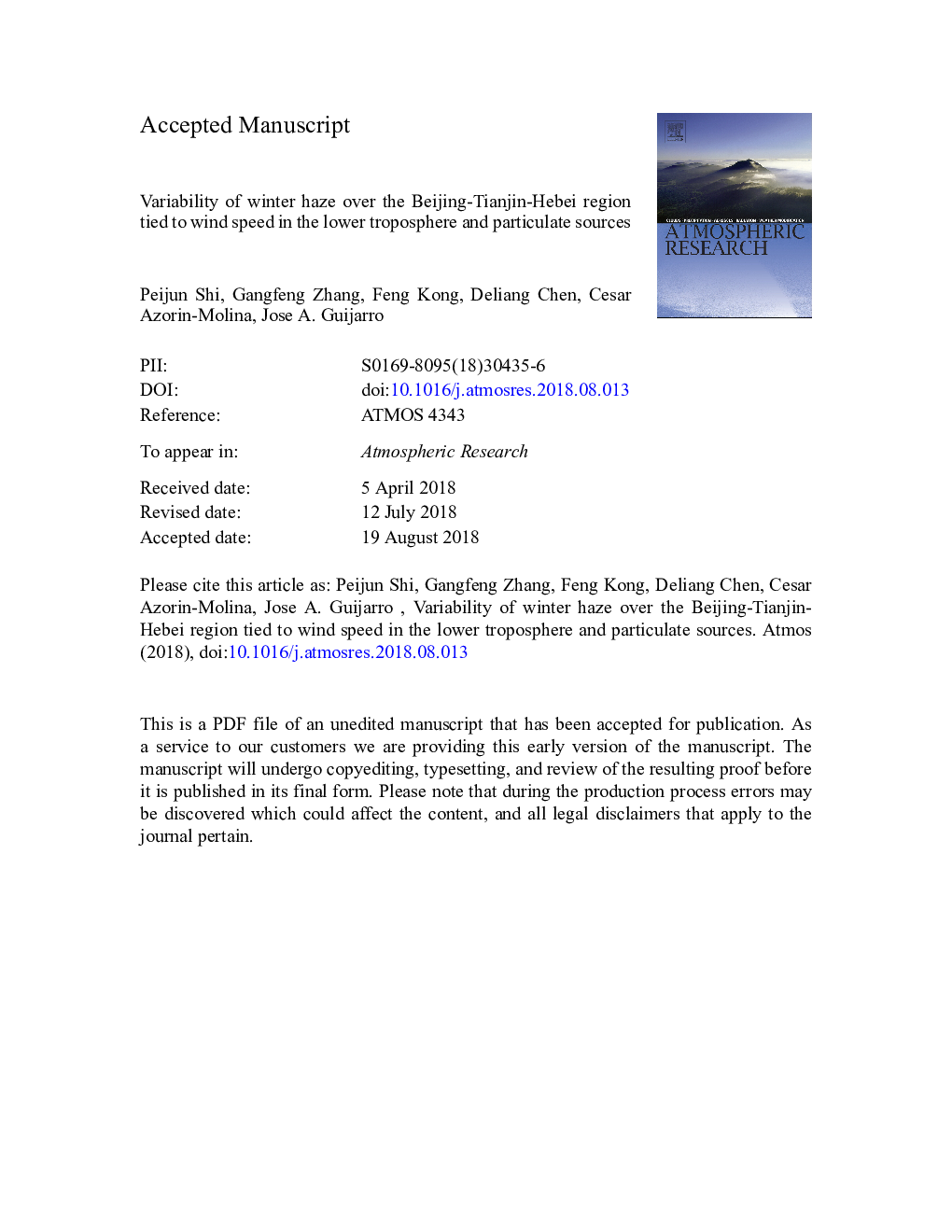| کد مقاله | کد نشریه | سال انتشار | مقاله انگلیسی | نسخه تمام متن |
|---|---|---|---|---|
| 8965974 | 1646756 | 2019 | 54 صفحه PDF | دانلود رایگان |
عنوان انگلیسی مقاله ISI
Variability of winter haze over the Beijing-Tianjin-Hebei region tied to wind speed in the lower troposphere and particulate sources
ترجمه فارسی عنوان
تغییرات ناگهانی زمستان در منطقه پکن-تیانجین-هبئی با سرعت باد در تروپوسفر پایین و منابع ذرات معلق
دانلود مقاله + سفارش ترجمه
دانلود مقاله ISI انگلیسی
رایگان برای ایرانیان
کلمات کلیدی
روز زمستان مه، دید، سرعت باد تغییر می کند تروپوسفر پایین فرکانس طوفان گرد و غبار، انتشار سوخت فسیلی، پکن-تیانجین-هبی،
موضوعات مرتبط
مهندسی و علوم پایه
علوم زمین و سیارات
علم هواشناسی
چکیده انگلیسی
This study analyzes the variability of winter haze days and visibility in the Beijing-Tianjin-Hebei (BTH) region, in relation to the regional average wind speed changes in the lower troposphere and emissions for 1961-2014. Winter mean surface meteorological data, NCEP/NCAR atmospheric reanalysis data, and fossil fuel emission data are used. The results reveal a significant increase in the haze days of +0.8â¯days decadeâ1 (pâ¯<â¯.01), and a subsequent decline in visibility of â1.56â¯km decadeâ1 (pâ¯<â¯.01). Most interestingly, an accelerated increase in the number of haze days was observed for the last 11-year period (+8.3â¯days decadeâ1, pâ¯<â¯.01) of the study period (2004-2014). Regression analysis indicates that the increase of haze occurrence and decrease in visibility are partly due to the significant (pâ¯<â¯.01) declining trend of the mean wind speed in the lower troposphere (â0.19â¯mâ¯sâ1 decadeâ1 at 10â¯m, (â0.23â¯mâ¯sâ1 decadeâ1 at 925â¯hPa), andâ¯ââ¯0.21â¯mâ¯sâ1 decadeâ1 at 850â¯hPa), and partly due to the declining (dust storm frequency as a proxy, â0.41â¯days decâ1) surrounding particulate sources and increasing fossil fuel emissions (total carbon emission as a proxy, +48,206.8 thousand metric tons decâ1). Specifically, wind speed changes in the lower troposphere explain 41.3% of the interannual varation of the winter haze days and 71.2% of the visibility variance. These are extended to 51.7% and 81.6% respectively when combined with information about the natural (dust storm frequency) and anthropogenic (fossil fuel emissions) particulate sources. Therefore, the analyses show that wind speed changes in the lower troposphere, together with the varied natural and anthropogenic sources of particulates, play a key role in modulating winter haze and visibility conditions in the BTH area.
ناشر
Database: Elsevier - ScienceDirect (ساینس دایرکت)
Journal: Atmospheric Research - Volume 215, 1 January 2019, Pages 1-11
Journal: Atmospheric Research - Volume 215, 1 January 2019, Pages 1-11
نویسندگان
Peijun Shi, Gangfeng Zhang, Feng Kong, Deliang Chen, Cesar Azorin-Molina, Jose A. Guijarro,
